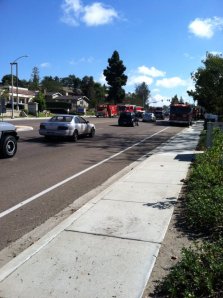God said . . . 
In order to understand Positional Christianity, you must understand that there is a flow to it. Prayer flows into praise, praise flows into hope, hope flows into healing, and healing flows into purpose. God did not think the world into existence. He spoke the world (I am using the term “the world” to speak of the universe and all that is within it) into existence. And from His words flowed forth creation (Gen 1).
So, if there is a flow to God’s words, there must also be a flow to our words. Though, before God spoke the world into existence, He had to think what He wanted. There was no world before He created one, so He had to know what He wanted, think it, and then speak it. His words were an expression of His desires and thoughts.
Intimate Communion with God
In the same way our praise is the outpouring of our intimate communion with God. That is the words we speak aloud in praise, and the good works we do, which He created for us to do (Eph 2:10), must be an outward expression of our intimate communion with God. If our words of love and honor to God, as well as our acts of service to God, do not flow forth from our intimate communion with God through prayer, then our alleged praise to God has little meaning.
Now, imagine if God told the angel Gabriel he could create a world and creatures to serve him (In other words, imagine Mormonism was true, with the Angel Gabriel in place of the demon Moroni). Imagine that we were that creation and we read a Bible given to us by Gabriel. Imagine this Bible said Gabriel created the world; though, the God who created the Angel Gabriel spoke forth and tried to create a world, but He did not have the power. What would you think of that God? You would probably think such a God who cannot see His words fulfilled through the creation of what He spoke is powerless.
Praise through Words and Works
Now, understand this is why James said, “faith by itself, if it does not have works, is dead (James 2:17).” If God had thought that He wanted to create a world and even tried to speak the world into existence, but that world never came into existence, we would think the faith of such a God dead. So, our praise, which is both our verbal expression of our love and honor of God and our action to glorify Him by serving Him and others, must flow forth from our prayers. The creation of the world was an expression of God’s desires and thoughts, and so also words of praise and acts of service must be an expression of the desires of our hearts that we gain through intimate communion with God. If we pray and our intimate communion with God does not flow forth into our praise through adoration and honor of God, as well as acts of service to God directly and indirectly by serving others, then our faith is dead.
If a man gave a woman whom He did not know, know anything about, or ever spent time with flowers, and then claimed that he loved her, his action and his words would have little meaning. She would think, ‘He cannot love me because He does not know me, my desires, or my needs.’ His expression of love and his act of giving her flowers would have little meaning. They would be self-serving, and could not be an expression of love or honor to her, because he would not have spent any time getting to know her, her needs, or how he could serve her.
So also our words of love and acts of service to God must flow from our times of intimate communion with God. If we do not spend time in intimate communion with God through prayer, then our attempts to adore Him and give Him honor are little more than out of “selfish ambition or vain conceit (Phil 2:3).” This is why the Apostle Paul said, “If I speak in the tongues of men or of angels, but do not have love, I am only a resounding gong or a clanging cymbal (I Cor 13:1).”
Praise without Prayer
Now, the question is do you go to church on Sunday and sing worship songs, and do you feed the homeless or give to the poor? That is great. But do spend time in intimate communion with God? Do you pray? I am not talking about 15 minutes a morning, of which 10 of those minutes is reading a daily devotional and scriptures to go along with it. Do you enter into His presence daily?
So, from what position do you praise God? Do you praise Him from the same position as that of the Samaritan woman at the well, who was more concerned with show (John 4:19)? Or do you praise Him from the position of wanting to know Him, which flows forth from your time of intimate communion with Him (John 4:24)?
Once a person begins to praise God in spirit and truth, their praise will begin to flow into hope. Praise that does not flow out of spending time becoming intimately acquainted with God through prayer cannot flow into hope. It can exist, but it will not flow into hope. Though, that person may praise God outwardly through verbal expressions of love and honor to God, and serving God and others, they will not gain hope and will remain stale like the waters of the Dead Sea until they enter into intimate communion with God.
Tell me, how is your prayer life? Do you notice that the more you pray, the more your times of intimate communion with God flows into wanting to praise God? Do you think you can praise God in Spirit and in truth without a strong prayer life? Share any thoughts you have with me.










 Department of Defense confirmed he had 160 kills, and he claimed another 95 unconfirmed kills. He was awarded several awards for his valor, was nicknamed the “Devil of Ramadi” by Iraqi Insurgents, survived two helicopter crashes and six IED attacks, and was an awesome Christian Husband and Father until the day he was killed at a shooting range in 2013. Chris Kyle’s and all snipers’ heroics teach us a great deal about what it means to be a Battle Ready Christian.
Department of Defense confirmed he had 160 kills, and he claimed another 95 unconfirmed kills. He was awarded several awards for his valor, was nicknamed the “Devil of Ramadi” by Iraqi Insurgents, survived two helicopter crashes and six IED attacks, and was an awesome Christian Husband and Father until the day he was killed at a shooting range in 2013. Chris Kyle’s and all snipers’ heroics teach us a great deal about what it means to be a Battle Ready Christian.